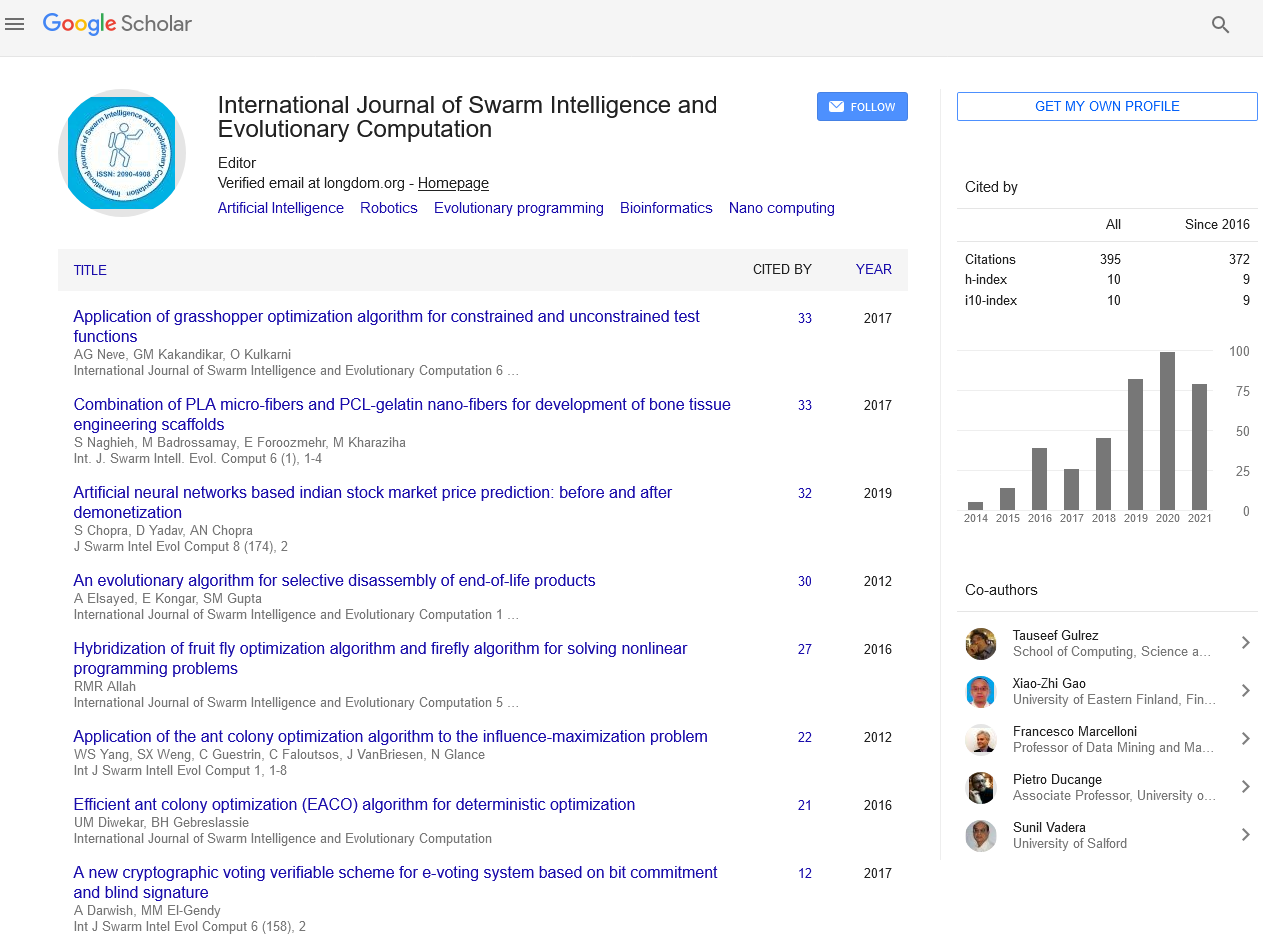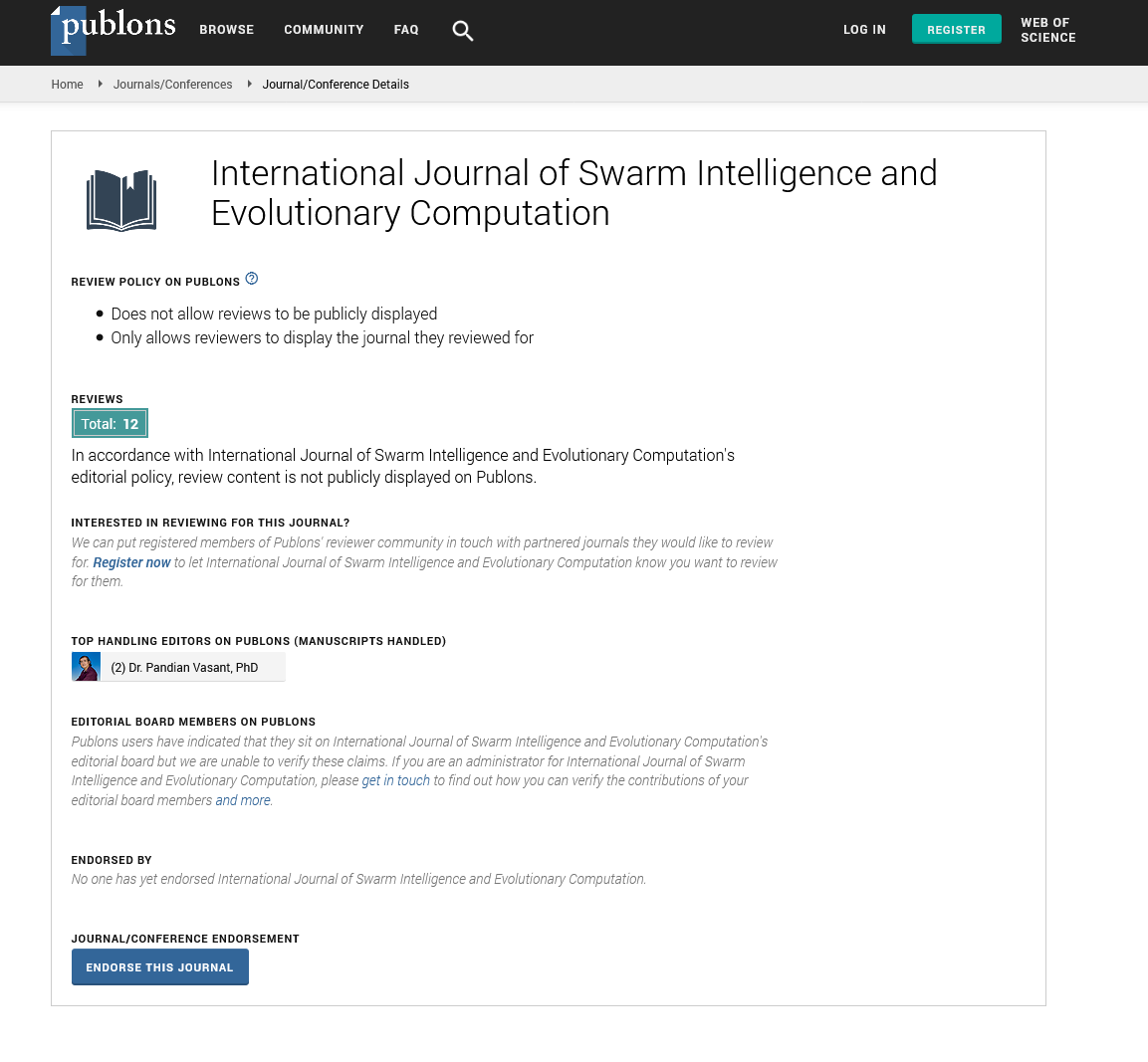Indexed In
- Genamics JournalSeek
- RefSeek
- Hamdard University
- EBSCO A-Z
- OCLC- WorldCat
- Publons
- Euro Pub
- Google Scholar
Useful Links
Share This Page
Journal Flyer

Open Access Journals
- Agri and Aquaculture
- Biochemistry
- Bioinformatics & Systems Biology
- Business & Management
- Chemistry
- Clinical Sciences
- Engineering
- Food & Nutrition
- General Science
- Genetics & Molecular Biology
- Immunology & Microbiology
- Medical Sciences
- Neuroscience & Psychology
- Nursing & Health Care
- Pharmaceutical Sciences
Perspective - (2022) Volume 11, Issue 1
An Overview of Digital Organism
Jianying Chen*Received: 04-Jan-2022, Manuscript No. SIEC-22-232; Editor assigned: 06-Jan-2022, Pre QC No. SIEC-22-232; Reviewed: 20-Jan-2022, QC No. SIEC-22-232; Revised: 25-Jan-2022, Manuscript No. SIEC-22-232; Published: 31-Jan-2022, DOI: 10.35248/2090-4908.22.11.232
Description
A digital organism is a self- replicating computer program that mutates and evolves. Digital organisms are used as a tool to study the dynamics of Darwinian elaboration, and to test or corroborate specific suppositions or fine models of elaboration. The study of digital organisms is nearly related to the area of artificial life.
Digital organisms can be traced back to the game Darwin, developed in 1961 at Bell Labs, in which computer programs had to contend with each other by trying to stop others from executing. A similar perpetration that followed this was the game Core War. In Core War, it turned out that one of the winning strategies was to replicate as presto as possible, which deprived the opponent of all computational resources. Programs in the Core War game were also suitable to change themselves and each other by overwriting instructions in the dissembled memory in which the game took place. This allowed contending programs to embed dangerous instructions in each other that caused errors, enslaved processes, or indeed change strategies mid- game and heal themselves.
Digital biology is across-correctional field that combines both natural and technological factors. It includes exploring and assaying living organisms with new intelligent tools. Recognizing the considerable eventuality of biotechnology, governmental associations, analogous as the National Institute of Biomedical Imaging & Bioengineering in advanced nations and the National Center for Biotechnology Information, increased their investments into the disquisition and development exertion in biotechnology fields.
Computer scientists and engineers work together to produce software and tackle to model complex systems and produce new technologies. The digital elaboration software, was created by a group of computer scientists and software engineers interested in the experimental study of digital organisms in order to more understand how natural selection factory and also to apply that knowledge to working computational problems. Evolutionary calculation styles can be applied to break a wide range of engineering design problems, analogous as the design of tonemanaging computational systems, robot software, and indeed the morphological characteristics of robots. In the coming days you are going to get the occasion to use the software to probe the process of natural selection.
Digital organisms give a unique occasion with which to study evolutionary biology in a form of life that shares no strain with carbon- grounded life forms, and hence to distinguish general principles of elaboration from literal accidents that are particular to biochemical life. In terms of the complexity of their evolutionary dynamics, digital organisms can be compared with biochemical contagions and bacteria. Recent studies of digital organisms have addressed long- term evolutionary adaptation and the growth of complexity in evolving systems, patterns of epistatic relations in various heritable backgrounds, and quasispecies dynamics.
Conclusion
Digital organisms have handed a means to examine evolutionary suppositions and events, analogous as decimation processes, which are nearly impossible to examine in an experimental setting. The composition reviews a number of analogous examinations in the area of emergence of specialized cells, chemical and environmental resistance, and inheritable severity. Although analogous studies have handed perceptivity into specific evolutionary suppositions, it's doubtful that digital organisms are suitable to observe evolutionary process unbounded by specific suppositions.
Citation: Chen J (2022) An Overview of Digital Organism. Int J Swarm Evol Comput. 11:232.
Copyright: © 2022 Chen J. This is an open-access article distributed under the terms of the Creative Commons Attribution License, which permits unrestricted use, distribution, and reproduction in any medium, provided the original author and source are credited.


